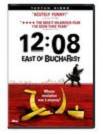|
|
||||
|
|
by Adam Hakari  On the surface, 12:08 East of Bucharest sounds like one of the most daunting viewings movie buffs will undergo in their entire lives. A picture that consists of a lot of talking and whose story is centered around an event most Americans will live without ever hearing a word about, this movie seems more like a thesis than a film. But somewhat lowered expectations may end up working here, because they open the door for this low-key comic treat to work its wry magic upon unsuspecting viewers. On December 22nd, 1989, Romanian dictator Nicolae Ceausescu fled the country, effectively putting an end to Communism with his departure. The 16th anniversary of the revolution is fast approaching, and to commemorate the occasion, small-town television host Virgil Jderescu (Teo Corban) wants to broadcast a discussion about that day and how its events have shaped their lives. Virgil's ramshackle, two-man guest panel ends up consisting of Emanoil Piscoci (Mircea Andreescu), a cranky old guy who plays Santa every Christmas, and Tiberiu Manescu (Ion Sapdaru), an alcoholic teacher with more debts than he has money to pay them off. What seems to be a boring, uneventful chat that needlessly dwells on the past soon changes into something more, as Tiberiu's claims of being among the first to protest Ceausescu's downfall are challenged by a number of viewers, raising a most puzzling question: did the revolution impact their tiny little town at all? Much like another recent Romanian import/critic's darling, The Death of Mr. Lazarescu, 12:08 East of Bucharest is being pushed mostly as a comedy, although it's not one in the sense you might be thinking about. The laughs aren't of the gut-busting, Superbad variety; they're rather a sly breed instead, drawn more from human behavior than from cheap slapstick. Irony plays a big part in 12:08 East of Bucharest, as the crux of the story involves whether the revolution actually effected the characters or if life just went on as usual, living in the Town That Time Forgot. The comedy comes from how the characters react to the hotly-debated situation, an approach putting a lot of trust in the quality of the performances, and it pays off. There's actually quite a lot to relate to in the film, for while Americans (or anyone else who's not Romanian, for that matter) may not be familiar with the story's historical background, it doesn't take much to become hooked by what the characters do when their own heritage comes into question. In one aspect, 12:08 East of Bucharest is a dissection of traditions. It's a happy accident that the events at the story's core take place so closely to Christmas, as Virgil's insistence the revolution be discussed by those who were there (or at least claim to have been there) nicely mirrors how rigidly the holidays themselves tend to be celebrated. There's even a little scene in which Virgil stops a band from playing Latin music and orders them to play a traditional Romanian dance song. Corban's performance as the stubborn TV host is one of great subtlety; his character's increasing strain as the broadcast grows out of control is low-pitched but noticeable. In contrast, Sapdaru's drunken teacher proves himself to be every bit as weary as he looks, an underachiever who's willing to defend to the death the proudest moment of his life -- which may or may not have happened. Andreescu's character, on the other hand, represents the sort of in-between, an average guy who was just there and spends most of his time on the show making little paper boats instead of waxing introspective about the revolution. True, there are moments when 12:08 East of Bucharest could have used a little pick-me-up in terms of tightening the pace, including a more varied turn of events, and letting the characters roam outside of the restrictive newsroom setting they're stuck in for pretty much the last hour of the running time. But despite these minor flaws, 12:08 East of Bucharest displays a sense of intelligence when it comes to letting the script say what it needs to say and fleshing out the characters beyond the corny caricatures they could have easily become. MY RATING: *** (out of ****) (Released by Tartan Video; not rated by MPAA.) |
||
|
© 2026 - ReelTalk Movie Reviews Website designed by Dot Pitch Studios, LLC |



